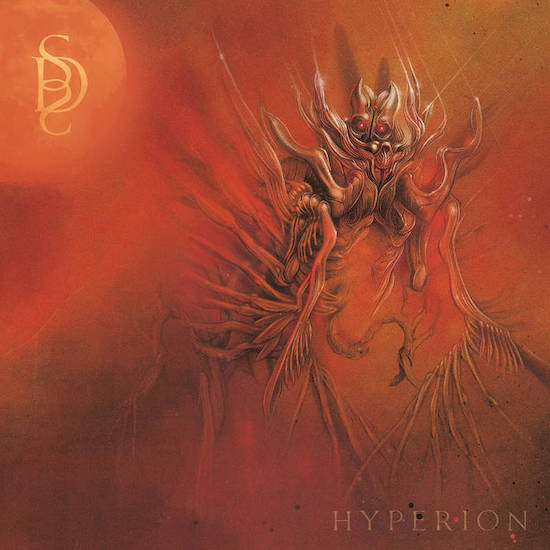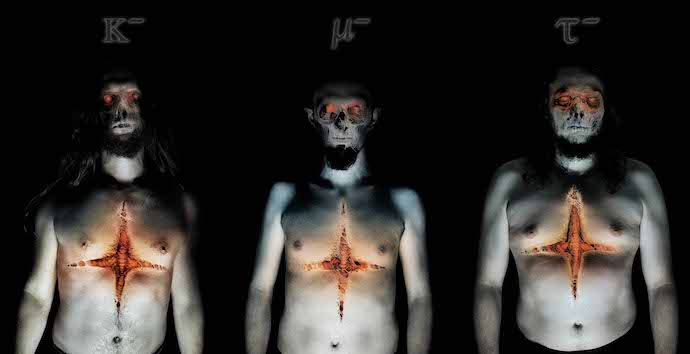
(This is DGR’s review of the debut album by the French band Sol Draconi Septem, which was released in March of this year.)
The genesis of this review happened some time ago and it is one that has been long simmering.
Believe it or not, it was actually our featuring of the prog band Wheel – of whom I’m a fan – in one of our round-ups a while back that was the ‘something different’ which caused the re-activation of dormant neurons that led to where we sit right now. In our round-up we covered their song “Fugue”, which is a peaceful interstitial number in between two much larger tracks on their latest album Resident Human, and our editor mentioned that the song had been inspired by the Hyperion Cantos series of books by Dan Simmons.
There are actually a few songs throughout Resident Human that take cues from those books, but it was that mention which reminded me that in one of the many metal rabbit holes I have a tendency to tumble down I had come across another group who also pulled inspiration from that series: the French space-prog/black-metal hybrid of Sol Draconi Septem and their early-March release of the aptly titled Hyperion.
If anything, I figured that if the admittedly excellent Wheel release wasn’t our usual reader fare, then the plumbing of the depths of space and all things synth that happens during the forty-five-or-so minutes of Hyperion probably would be.

The musical trope of having your album immediately start with a high-adrenaline, high-speed, attention-grabbing eruption is immediately bucked by the French three-piece behind Sol Draconi Septem on Hyperion. If anything, the first few seconds of “The Man Who Cried God” are more likely to tell you about what to expect from Hyperion than deliver a knock-down bludgeoner of a song.
By leaning hard on the opening keyboard synth work, Sol Draconi Septem immediately invoke the spirits of many a sci-fi movie soundtrack as well as the overall aesthetic – as portrayed by current popular culture – so that when “The Man Who Cried God” works out to be a slower-moving song, filled not only with howled vocals but also a multitude of melodic guitar lines, it has already been spelled out that the ‘black metal’ within Sol Draconi Septem‘s musical arsenal isn’t just a simple weapon but a binding agent for ambitiously joining together a multitude of disparate genres. That also helps explain the multiple saxophone hits spread throughout the song, not only as the major closing lead-part of “The Man Who Cried God” but also a recurring motif throughout Hyperion as a whole – including a much more prominent role in “The War Lover”.
Metal’s current obsession with the galaxy and the cosmos – often a ‘What if Satan…..but space?’ perspective – is proving to be fruitful ground. So it makes sense that you’ll see a lot more spotlight being given to actual science fiction writing as well. Of course, that it often works out to also be a bunch of ambient atmospherics, electronics filled, unexpected instrumentation, and big keyboard swells is nothing to knock against it either.
Where Hyperion crystalizes as an album is during its third and fourth songs – “The Avatar” and the song title as album concept blatantly stated, “The Hyperion Cantos”. These are also where the disc becomes more recognizably black metal at times after the initial acceleration into the elysian fields of blast-beats that was the closing moments of “The War Lover”. During both “The Avatar” – which would be a recommendation as a small picture of Hyperion as a whole – and “The Hyperion Cantos”, everything available to the three-piece of Sol Draconi Septem is deployed in mass quanitites.
If you’re curious just how many tons of howling vocals can be packed into a disc alongside a wall of hammering drums and guitars drowned out by synth and sax then those two songs are perfect. They’re a conclusion to a perhaps unintentional musical arc built up to in the first two songs of Hyperion, where elements are more slowly played out, only for them to be exposed fully during those two songs and then made liberal use of for the rest of the album – espeically during “The Long Goodbye”.
While Sol Draconi Septem shroud themselves in mystery – electing to go by the names Muon, Tauon, and Kaon – unveiling much of the music on Hyperion so early can make the album’s forty-five or so minutes seem to stretch a little thin. Hyperion does get by on the strength of its concept a little bit since it isn’t too often that you see a group mining the depths of a sci-fi novel series; more often it feels like bands are busy writing their own. Yet since most of the songs here share similar tempos and atmospherics, you may find yourself checking what song you’re on right about the time of “I Remember Siri”.
It’s certainly difficult to guess what could or couldn’t have been left by the wayside, because broken out on their own, each song on Hyperion works as a snapshot of off-kilter and avante-garden synth and black metal heavy hybrid, and it’s tempting to want to reward the sheer ambition. But since Hyperion stretches itself a little long, the recommendation of taking a deep dive into it comes with the usual ‘prepare for the journey’ disclaimer.
Yet it’s an album that does come recommended, in part just because the early moments on the album where every piece of the band’s arsenal seems to line up for the first time are fantastic. You get swept up in the atmospherics of Hyperion in those early songs and each new thing seems to come completely out of left field. If anything, as a full-length debut after two single releases, Hyperion is impressive on that front and a promising show if the band are capable of acting on what works for them throughout this disc.
BANDCAMP:
https://soldraconiseptem.bandcamp.com/releases
FACEBOOK:
https://www.facebook.com/soldraconiseptemfr
